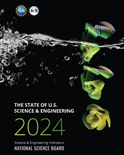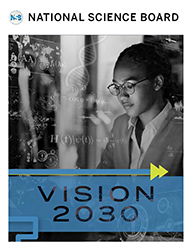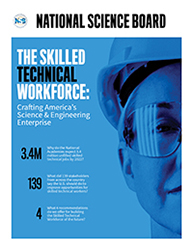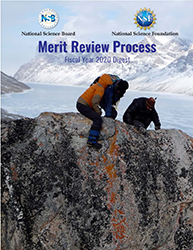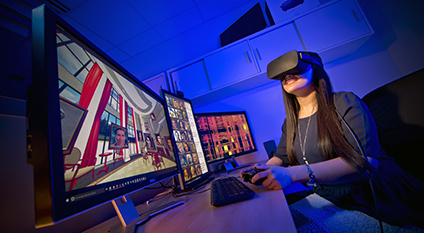Task Force on the Skilled Technical Workforce (STW)
The National Science Board (NSB) Task Force on the Skilled Technical Workforce is charged with identifying the opportunities and challenges facing students, incumbent workers, businesses, educators, and others involved with the skilled technical workforce (STW) and recommending to the NSB strategies to strengthen the STW. Estimates suggest that there are over 16 million skilled technical jobs for workers with an associate degree, or similar level qualification, rather than a four-year degree.
The National Science Foundation’s mission includes a mandate to support science and engineering education programs at all levels and technical education and training at associate degree-granting colleges.
We invite you to explore NSB’s current and past work on the STW, including the 2015 report which called for building a STEM-capable U.S. workforce, our 2018 policy brief, listening sessions we’ve held with students, faculty, employers, and policymakers in different regions of the U.S., and other activities, including congressional testimony by STW Task Force Chair Victor McCrary.
NSB Skilled Technical Workforce Listening Sessions
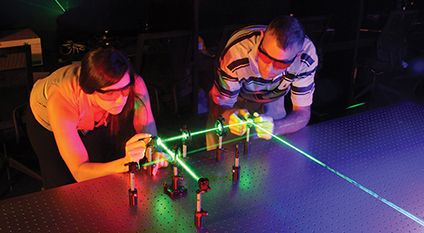
NSB's Skilled Technical Workforce Task Force held a listening session at the Advanced Technological Education Principal Investigators' Conference, Oct. 25, 2018.
NSB's Skilled Technical Workforce Task Force held a listening session at Florence - Darlington Technical College, Sept. 26, 2018.
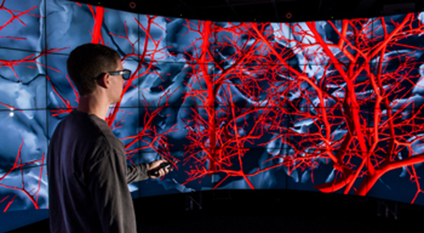
NSB's Skilled Technical Workforce Task Force held a listening session at NSF's Community College Innovation Challenge, June 12, 2018.
NSB's Skilled Technical Workforce Task Force held a listening session at Macomb Community College, Apr. 19, 2018.
NSB's Skilled Technical Workforce Task Force held a listening session at Baton Rouge Community College, Oct. 26, 2017.
Congressional Activities
Victor McCrary, Chair of NSB's Skilled Technical Workforce Task Force, was on the Congressional Black Caucus Technology and Infrastructure Development Task Force panel on “Blue Collar STEM: The Future of the U.S. Workforce.”
Victor McCrary, Chair of NSB's Skilled Technical Workforce Task Force, testified before the House Subcommittee on Research and Technology on "Mentoring, Training, and Apprenticeships for STEM Education and Careers."
Videos
Industry leaders discuss their skilled technical workforce needs.
Reavelyn Pray, student at Texas A&M Corpus Christi, discusses her path from community college to a planned career in STEM entrepreneurship.
NSB members, employers, and students discuss the opportunities that exist in the skilled technical workforce.
Victor McCrary, Chair of NSB's Skilled Technical Workforce Task Force, discusses the importance of the skilled technical workforce.
Florence-Darlington Technical College's newscast of NSB's Skilled Technical Workforce Task Force listening session.
Policy Statements
NSB Skilled Technical Workforce Meetings
May 2019 NSB Skilled Technical Workforce Session
November 2018 NSB Skilled Technical Workforce Session
July 2018 NSB Skilled Technical Workforce Session
May 2018 NSB Skilled Technical Workforce Session
February 2018 NSB Skilled Technical Workforce presentation "Grow with Google" by Lisa Gevelber
August 2017 NSB Skilled Technical Workforce panel discussion
The National Science Board (NSB; Board) Task Force on the Skilled Technical Workforce is established and charged to identify the opportunities and challenges facing students, incumbent workers, businesses, educators, and others involved with the skilled technical workforce (STW) and recommend to the NSB strategies, including possible policies, for strengthening the STW.
In fulfilling this charge, the Task Force is expected to work closely with NSF and relevant stakeholders within and outside the government.
“The Board shall render to the President and the Congress reports on specific, individual policy matters within the authority of the Foundation (or otherwise as requested by the Congress or the President) related to science and engineering and education in science and engineering, as the Board, the President, or the Congress determines the need for such report.” 42 U.S.C. § 1863(j)(2)
NSF is directed to support “…programs to strengthen scientific research potential and science education programs at all levels in the mathematical, physical, medical, biological, social, and other sciences…and programs to strengthen engineering research potential and engineering education programs at all levels in the various fields of engineering…” [42 U.S.C. § 1862(a)(1)]. NSF is also directed to support scientific and technical education by strengthening and expanding the scientific and technical education and training capabilities of associate-degree-granting colleges. [42 U.S.C. § 1862(h)]
The National Science Foundation (NSF) has a broad mission with respect to creating a science, technology, engineering, and math (STEM)-capable U.S. workforce. In its 2015 report, Revisiting the STEM Workforce, the NSB called for creating a STEM-capable U.S. workforce comprising individuals from all demographic groups, at all education levels, and in all geographical locales who need STEM capabilities to succeed in a knowledge-based, globally competitive economy.
The pervasiveness of science and technology (S&T) in the economy has changed the nature of work for individuals at all education levels, including those without a 4-year degree. There are over 16 million skilled technical jobs for workers with an associate degree, or similar qualification rather than a bachelor’s degree. The individuals who use STEM knowledge and skills in their jobs but who do not have a 4-year degree make up the “skilled technical workforce.”
Skilled technical workers are important to U.S. economic competitiveness. Businesses cite the availability of highly skilled workers as critical to their ability to compete globally, yet regularly express difficulty in finding workers to fill these jobs. The STW also plays an important role in advancing our national security. Industries that are critical to our national security and defense—including aerospace, advanced manufacturing, information technology, healthcare, and cybersecurity—rely on access to these workers. The STW is also important to scientific progress. Industry representatives estimate that they need between 7–20 skilled technicians for every scientist or engineer with an advanced degree.
There are several ways that individuals gain these skills, including military training, apprenticeships, associate degrees and certificate programs. Because of the flexibility, accessibility, and relative affordability of the programs they offer, community and technical colleges serve as a key entry point into the STW for students from all backgrounds. They provide these students with linkages to local industry, but also empower them to pursue further education and follow multiple pathways into STEM careers. According to National Center for Science and Engineering Statistics (NCSES) data, 47% of all recent S&E graduates had done some coursework in a community college.
Community and technical colleges serve a diverse student body. More than half (56%) of all community college students are female. The majority of Native American (56%) and Hispanic (52%) undergraduates choose to pursue a college education at community colleges. African Americans (43%) and Asian Pacific Islanders (40%) undergraduate students also enroll in community college programs at high rates. 2
The Task Force is expected to complete its major activities within 18 months of approval of this Charge. The Task Force is also expected to provide the NSB with an interim report of its activities, including any modifications to its objectives and a list of expected deliverables, following the Stakeholder Symposium.
The Task Force on the Skilled Technical Workforce will assess how the Board and Foundation might strengthen the STW in the United States. The Task Force may:
- Identify and examine data on the STW, including data on technical occupations, training, career pathways and outcomes; identify gaps in the currently available data.
- Consider strategies to leverage Science and Engineering Indicators (Indicators) and Indicators-related resources as a possible outlet for existing and new data on the STW.
- Understand the incentives and barriers to pursuing skilled technical occupations, including:
- Secondary school preparation in math and science
- Alignment of training programs with local and high-priority industry needs
- Human resources (HR) recruitment/hiring practices
- Cost of and access to education and mid-career retraining
- Mentoring
- Students, parents, educators, and other stakeholders’ awareness and perception of these jobs
- Identify strategies to enhance existing and foster new long-term partnerships among community colleges, 4-year colleges and universities, local business, labor and industries, national laboratories, nonprofits, and relevant state and Federal agencies; identify strategies for leveraging these partnerships.
- Explore opportunities to further leverage current NSF investments in STW specifically, and STEM education and human capital development broadly, including making undergraduate and graduate education more relevant and responsive to changes in the composition and needs of a globally competitive domestic workforce.
- Identify strategies for the Board (full Board and standing committees) and NSF to strengthen the skilled technical workforce that do not require additional Federal appropriations.
- Consider how technological change (e.g., automation) shapes the demands on the STW and the role that different education and training models play in enabling U.S. workers to adapt to these changes.
- Explore how work on this dynamic and increasingly important segment of the STEM-capable workforce can inform current discussions around undergraduate and graduate education, including the growing importance of lifelong learning and discussions about the impact of skills and competencies assessments.
| Chair: | Victor “Vic” McCrary |
| Members: |
Vicki Chandler |
| NSBO Staff: | Matthew Wilson Reba Bandyopadhyay Mateo Munoz |
1Charge (NSB-2017-41) approved by the Board on November 9, 2017.
2See Fast Facts published by the American Association of Community Colleges, https://www.aacc.nche.edu/research-trends/fast-facts/.
